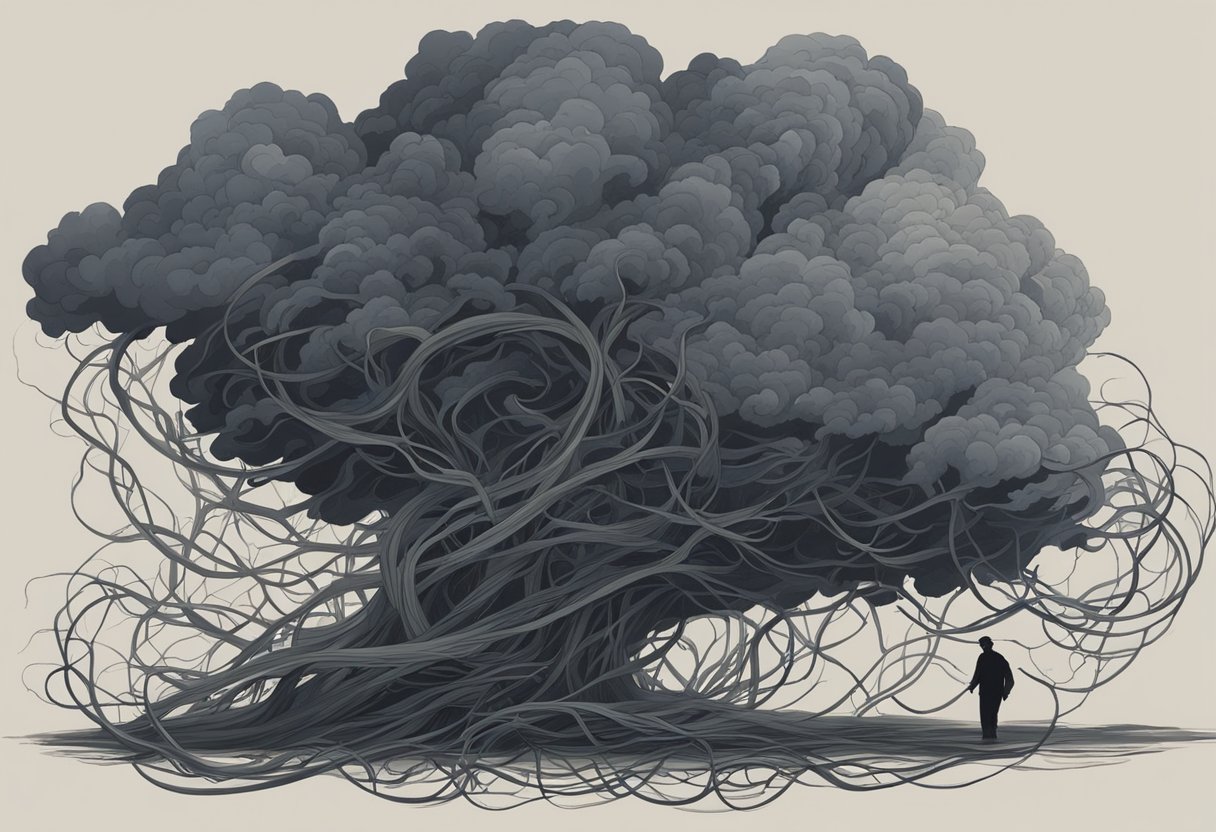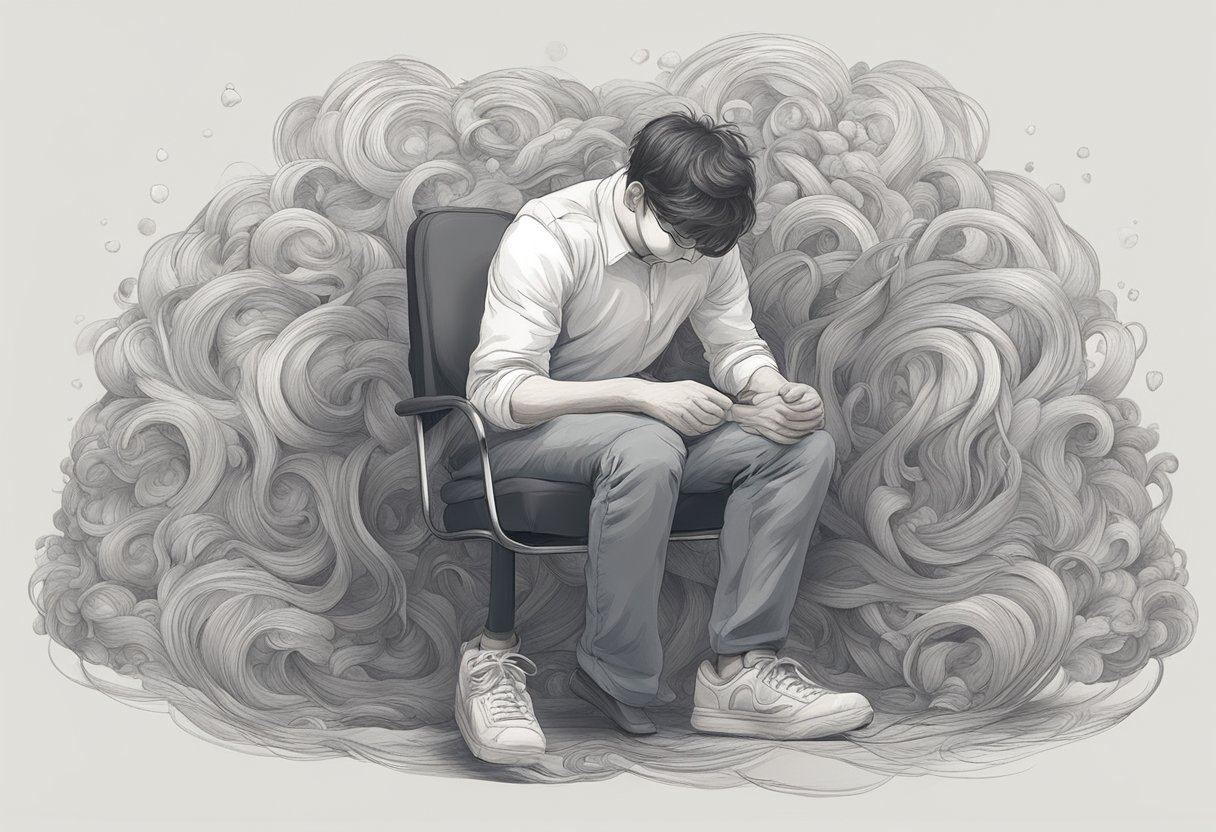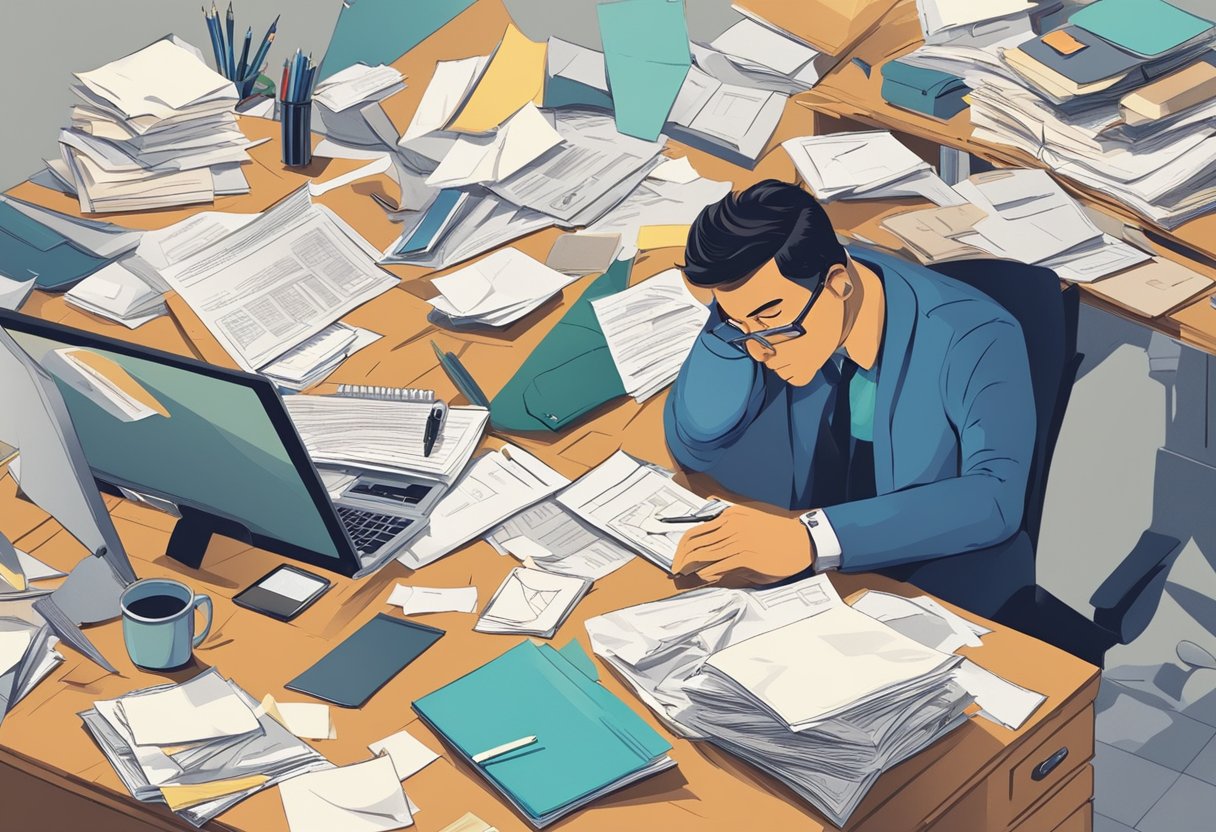Learn about chronic anxiety, its causes, symptoms, and treatments in this informative article. Gain knowledge and understanding of this common mental health condition.
Table of Contents
Introduction – Chronic Anxiety
Chronic anxiety is a mental health condition that affects millions of people worldwide. It is characterized by persistent and excessive worry, fear, and apprehension that can interfere with daily life. A variety of factors, including genetics, environmental stressors, and traumatic life events, can cause chronic anxiety.

People with chronic anxiety often experience physical symptoms like headaches, muscle tension, and fatigue. The condition can also have a negative impact on mental health, leading to depression, social isolation, and a reduced quality of life. However, with proper diagnosis and treatment, chronic anxiety can be managed effectively, allowing individuals to lead fulfilling and productive lives.
Key Takeaways
- Chronic anxiety is a mental health condition characterized by persistent and excessive worry, fear, and apprehension that can interfere with daily life.
- The condition can have a negative impact on both physical and mental health, leading to symptoms like headaches, muscle tension, fatigue, depression, and social isolation.
- However, with proper diagnosis and treatment, chronic anxiety can be managed effectively, allowing individuals to lead fulfilling and productive lives.
Understanding Chronic Anxiety

Chronic anxiety is a mental health disorder that affects millions of people worldwide. It is a persistent feeling of worry, fear, or apprehension that lasts for an extended period. Chronic anxiety can interfere with daily activities and impact a person’s quality of life.
Types of Anxiety Disorders
There are different types of anxiety disorders, including Generalized Anxiety Disorder (GAD), Panic Disorder, Social Anxiety Disorder, Separation Anxiety Disorder, and Specific Phobias. Each type has its unique symptoms and signs.
Common Symptoms and Signs
The symptoms and signs of chronic anxiety can vary from person to person. However, some common symptoms include excessive worry, irritability, difficulty concentrating, fatigue, muscle tension, and sleep disturbances.
Causes and Risk Factors
The causes of chronic anxiety are not well understood. However, research suggests that it can be caused by a combination of factors, including genetics, environmental factors, and personality traits. A family history of anxiety disorders, traumatic experiences, and high levels of stress can also increase the risk of developing chronic anxiety.
According to a search result from Verywell Mind, chronic anxiety symptoms can change over time, and they will likely have been persistent for a long period. The same search result also notes that chronic anxiety can cause physical symptoms such as nausea, headaches, stomach pain, and muscle tension or pain.
Another search result from Mayo Clinic states that having an anxiety disorder can lead to or worsen other mental and physical conditions such as depression, trouble sleeping, digestive or bowel problems, headaches, and chronic pain.
A search result from Calm Clinic suggests that those with chronic anxiety often experience both physical and mental symptoms such as excessive worries, shaking, nausea, vomiting, diarrhea, rapid heartbeat, and chest pain.
| Source | Key Findings | Keywords/Entities |
|---|---|---|
| Verywell Mind | Chronic anxiety symptoms can change over time, and they will likely have been persistent for a long period. Chronic anxiety can cause physical symptoms such as nausea, headaches, stomach pain, and muscle tension or pain. | Chronic anxiety, physical symptoms, nausea, headaches, stomach pain, muscle tension |
| Mayo Clinic | Having an anxiety disorder can lead to or worsen other mental and physical conditions such as depression, trouble sleeping, digestive or bowel problems, headaches, and chronic pain. | Anxiety disorder, mental conditions, physical conditions, depression, trouble sleeping, digestive problems, bowel problems, headaches, chronic pain |
| Calm Clinic | Those with chronic anxiety often experience both physical and mental symptoms such as excessive worries, shaking, nausea, vomiting, diarrhea, rapid heartbeat, and chest pain. | Chronic anxiety, physical symptoms, mental symptoms, excessive worries, shaking, nausea, vomiting, diarrhea, rapid heartbeat, chest pain |
Impact of Anxiety on Daily Life

Anxiety can have a significant impact on a person’s daily life. It can affect their relationships, work, education, and overall quality of life. In this section, we will explore how anxiety affects daily life and what steps can be taken to manage it.
Effects on Relationships and Social Situations
Anxiety can cause a person to worry excessively about their relationships with others. They may fear rejection or abandonment, leading them to avoid social situations or withdraw from relationships altogether. This can have a negative impact on their mental health and overall well-being.
According to a study by MentalHealth.com, anxiety can also lead to physical symptoms such as sweating, trembling, and blushing, which can further exacerbate social anxiety. Individuals with anxiety may also have difficulty sleeping, which can affect their ability to interact with others during the day.
To cope with anxiety in social situations, individuals can try relaxation techniques such as deep breathing or visualization. They can also seek support from friends, family, or a mental health professional.
Challenges in Work and Education
Anxiety can also impact a person’s ability to perform well in their job or education. They may struggle to concentrate, make decisions, or complete tasks on time. This can lead to feelings of frustration, low self-esteem, and depression.
According to a study by Mayo Clinic, chronic stress can also put a person’s physical health at risk, leading to conditions such as high blood pressure, heart disease, and obesity. This can further impact a person’s ability to perform well in their job or education.
To manage anxiety in the workplace or school, individuals can try to establish a routine, set realistic goals, and take breaks when needed. They can also seek support from colleagues, supervisors, or a mental health professional.
| Source | Key Findings | Keywords/Entities |
|---|---|---|
| MentalHealth.com | Anxiety can lead to physical symptoms such as sweating, trembling, and blushing. | worry, fear, nervous, mind |
| Mayo Clinic | Chronic stress can put a person’s physical health at risk, leading to conditions such as high blood pressure, heart disease, and obesity. | stress, physical health |
| Verywell Mind | Chronic anxiety can significantly impact a person’s ability to function at home, work, and in social settings. | anxiety, cope, routine, quality of life, daily activities |
| Healthline | Chronic anxiety can cause physical stress on a person’s body, especially to their nervous, cardiovascular, digestive, immune, and respiratory systems. | physical health, women |
Diagnosis and Treatment Options

Chronic anxiety can be a debilitating condition that affects a person’s quality of life. It is important to seek professional help to diagnose and treat this condition. There are several options available to help manage chronic anxiety, including medication, therapy, and lifestyle changes.
Professional Diagnosis
A professional diagnosis is essential for the proper treatment of chronic anxiety. A psychologist or psychiatrist can diagnose anxiety disorders through a series of interviews, questionnaires, and assessments. It is important to provide a complete medical history to the professional, as well as a list of symptoms and their severity.
Medication and Therapy
Medications can be used to manage chronic anxiety. There are several types of medications available, including antidepressants, benzodiazepines, and beta-blockers. Each medication has its own set of benefits and risks, and it is important to work with a healthcare professional to determine the best course of treatment.
Cognitive-behavioral therapy (CBT) is a type of psychotherapy that can be used to treat chronic anxiety. CBT focuses on changing negative thoughts and behaviors that contribute to anxiety. It can be used in combination with medication to achieve the best results.
Alternative Treatments and Lifestyle Changes
In addition to medication and therapy, several alternative treatments and lifestyle changes can help manage chronic anxiety. Relaxation techniques, such as deep breathing and meditation, can help reduce anxiety symptoms. Regular exercise and a healthy diet can also help manage chronic anxiety.
Support groups can be helpful for those with chronic anxiety. It can be comforting to know that others are going through similar experiences. Support groups can provide a safe space to share experiences and receive support.
According to Verywell Mind, a combination of medication and therapy is often the most effective way to manage chronic anxiety. However, it is important to work with a healthcare professional to determine the best course of treatment for each individual.
| Source | Key Findings | Keywords |
|---|---|---|
| Verywell Mind | A combination of medication and therapy is often the most effective way to manage chronic anxiety. | Medication, Therapy, Healthcare Professional |
| Mayo Clinic | Psychotherapy and medications are the two main treatments for anxiety disorders. | Medications, Psychotherapy, Anxiety disorders |
| National Institute of Mental Health (NIMH) | Panic disorder is a type of anxiety disorder that can cause significant distress and impairment. | Panic disorder, Anxiety disorder, Impairment |
| Cleveland Clinic | Anxiety disorders can make it difficult to get through the day. | Anxiety disorders, Mental health conditions, Nervousness |
Managing Symptoms and Coping Strategies

Chronic anxiety can be a challenging condition to manage, but there are several coping strategies that can help individuals manage their symptoms. These strategies can be divided into two categories: stress management and relaxation techniques, and building a supportive environment.
Stress Management and Relaxation Techniques
Stress management and relaxation techniques can help individuals cope with the tension and focus that often accompany chronic anxiety. Some effective techniques include:
- Meditation: Meditation is a practice that involves focusing the mind on a particular object, thought, or activity to achieve a state of calmness and relaxation. Research has shown that meditation can help reduce anxiety and stress levels. A study published in the Journal of Psychiatric Practice found that meditation was effective in reducing symptoms of anxiety and depression in patients with generalized anxiety disorder.
- Yoga is a physical and mental practice combining physical postures, breathing exercises, and meditation or relaxation. It is effective in reducing anxiety and stress levels. A study published in the Journal of Alternative and Complementary Medicine found that a 12-week yoga program was effective in reducing symptoms of anxiety in patients with generalized anxiety disorder.
- Exercise: Exercise is a natural stress reliever that can help reduce anxiety and tension. Regular exercise can also improve overall physical health, which can in turn improve mental health. A study published in the Journal of Psychiatric Research found that regular exercise was effective in reducing symptoms of anxiety and depression in patients with generalized anxiety disorder.
Building a Supportive Environment
Building a supportive environment can also help individuals cope with chronic anxiety. Some effective strategies include:
- Support Groups: Support groups can provide individuals with a safe and supportive environment to discuss their anxiety and share coping strategies. They can also help individuals feel less alone and isolated. A study published in the Journal of Anxiety Disorders found that participation in a support group was effective in reducing symptoms of anxiety in patients with social anxiety disorder.
- Lifestyle Changes: Lifestyle changes such as reducing caffeine intake, getting enough sleep, and eating a healthy diet can also help individuals manage their anxiety. Caffeine is a stimulant that can increase anxiety and tension, so reducing or eliminating caffeine intake can be helpful. A study published in the Journal of Psychopharmacology found that caffeine can increase anxiety levels in individuals with generalized anxiety disorder.
Here are some sources that provide more information on managing chronic anxiety:
| Source | Key Findings | Keywords |
|---|---|---|
| Mayo Clinic | Exercise, relaxation techniques, and lifestyle changes can help manage anxiety. | Exercise, relaxation techniques, lifestyle changes |
| National Institute of Mental Health | Support groups, therapy, and medication can help manage anxiety. | Support groups, therapy, medication |
| Anxiety and Depression Association of America | Exercise, relaxation techniques, and lifestyle changes can help manage anxiety. | Exercise, relaxation techniques, lifestyle changes |
Prevention and Awareness

Chronic anxiety can be a debilitating condition that affects a person’s ability to function in their daily life. It is important to take steps to prevent anxiety from becoming chronic and to increase awareness of the condition.
Educating Family and Community
One way to prevent anxiety from becoming chronic is to educate family and community members about the condition. By increasing awareness of anxiety, people can learn to recognize the signs and symptoms of the condition and seek help early on. According to a source, early intervention can lead to better outcomes for people with anxiety disorders.
Recognizing Early Warning Signs
Another way to prevent chronic anxiety is to recognize the early warning signs. Some common signs of anxiety include excessive worry, restlessness, irritability, and difficulty sleeping. By recognizing these signs, people can seek help before the condition becomes chronic. According to a source, incorporating exercise into daily activities can decrease stress hormones that contribute to anxiety and improve overall mood.
| Sources | Key Findings | Keywords/Entities |
|---|---|---|
| National Institute of Mental Health | Early intervention can lead to better outcomes for people with anxiety disorders. | anxiety, early intervention |
| Anxiety.org | Exercise can decrease stress hormones that influence anxiety and improve overall mood. | anxiety, exercise |
| Psychology Today | Having an awareness of anxiety is the first step in managing it. | anxiety, awareness |
| Mayo Clinic Health System | Visualization techniques, meditation, and yoga are examples of relaxation techniques that can ease anxiety. | anxiety, relaxation techniques |
It is important to take steps to prevent anxiety from becoming chronic. Educating family and community members about anxiety and recognizing the early warning signs can help prevent the condition from worsening. By incorporating exercise and relaxation techniques into daily activities, people can also decrease stress hormones contributing to anxiety and improving overall mood.
Frequently Asked Questions
What are the common symptoms of a severe anxiety attack?
A severe anxiety attack can be a terrifying experience that can produce a range of physical and emotional symptoms. Common symptoms of a severe anxiety attack include chest pain or tightness, rapid heartbeat, sweating, trembling, shortness of breath, nausea, dizziness, and a feeling of impending doom or danger. In severe cases, an anxiety attack can lead to a panic attack, which can cause intense fear and physical symptoms such as sweating, shaking, and difficulty breathing.
Source: Verywell Mind
How is generalized anxiety disorder (GAD) diagnosed?
To diagnose generalized anxiety disorder (GAD), a healthcare professional will typically perform a physical exam and ask questions about the patient’s symptoms, medical history, and any other factors that may be contributing to their anxiety. They may also use psychological tests and assessments to determine the severity of the patient’s anxiety and rule out other potential causes of their symptoms. To be diagnosed with GAD, a patient must have experienced excessive anxiety and worry about a variety of everyday problems for at least six months.
Source: Mayo Clinic
What are the underlying causes of anxiety disorders?
The underlying causes of anxiety disorders are not fully understood, but research suggests that a combination of genetic, environmental, and psychological factors may play a role. Some people may be more prone to anxiety due to their genetic makeup or brain chemistry. In contrast, others may develop anxiety as a result of traumatic experiences, chronic stress, or other environmental factors. Additionally, certain medical conditions and medications may contribute to the development of anxiety disorders.
Source: Anxiety and Depression Association of America
What are the most effective treatments for managing chronic anxiety?
There are several effective treatments for managing chronic anxiety, including therapy, medication, and lifestyle changes. Cognitive-behavioral therapy (CBT) is a type of talk therapy that can help patients identify and change negative thought patterns and behaviors that contribute to their anxiety. Medications such as antidepressants and benzodiazepines may also be prescribed to help manage anxiety symptoms. Lifestyle changes such as exercise, meditation, and stress management techniques can also be effective in reducing anxiety.
Source: BetterHelp
Can you describe the different types of anxiety disorders?
There are several different types of anxiety disorders, each with its own set of symptoms and diagnostic criteria. Generalized anxiety disorder (GAD) is characterized by excessive worry and anxiety about everyday problems. Sudden and unexpected panic attacks characterize panic disorder. Social anxiety disorder is characterized by intense fear and anxiety in social situations. Specific phobias are characterized by intense fear and avoidance of specific objects or situations. Obsessive-compulsive disorder (OCD) is characterized by intrusive and repetitive thoughts or behaviors.
Source: Psych Central
What strategies can help in coping with chronic anxiety on a daily basis?
Several strategies can help individuals cope with chronic anxiety on a daily basis. These include practicing relaxation techniques such as deep breathing and meditation, regular exercise, maintaining a healthy diet, getting enough sleep, and reducing stress through yoga or massage. Additionally, seeking support from friends, family, or a mental health professional can help manage anxiety symptoms.
Source: Verywell Mind
